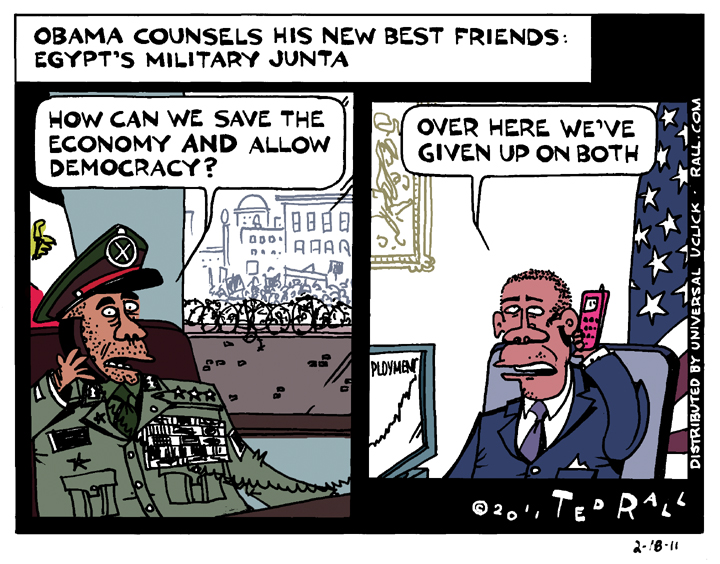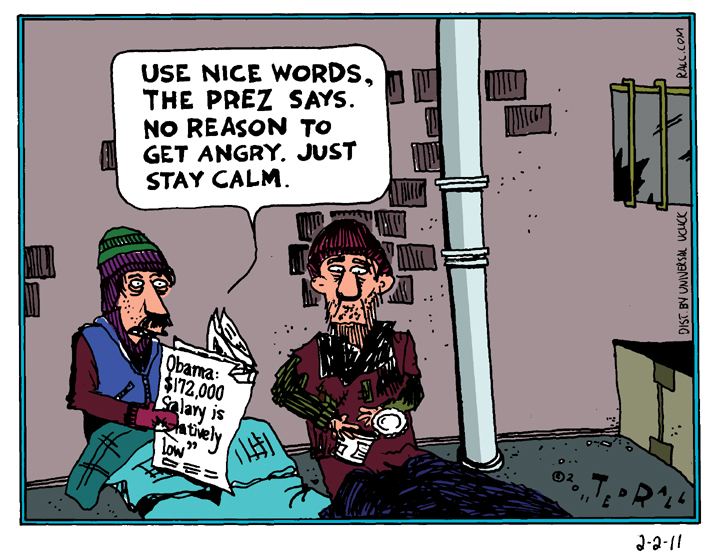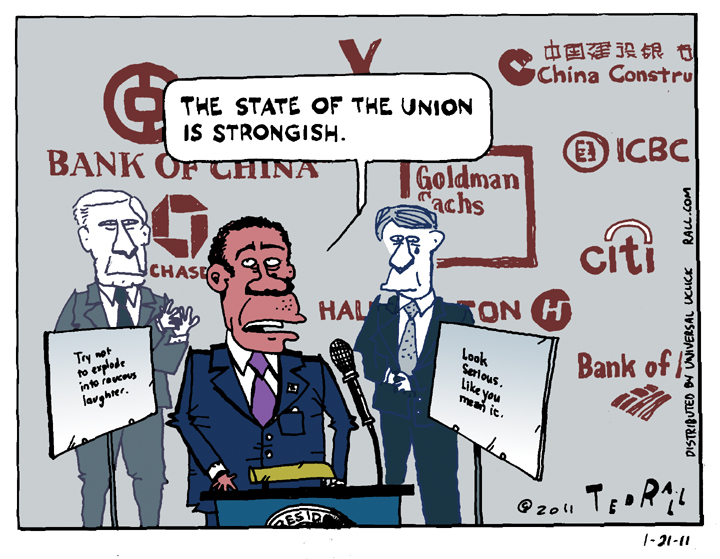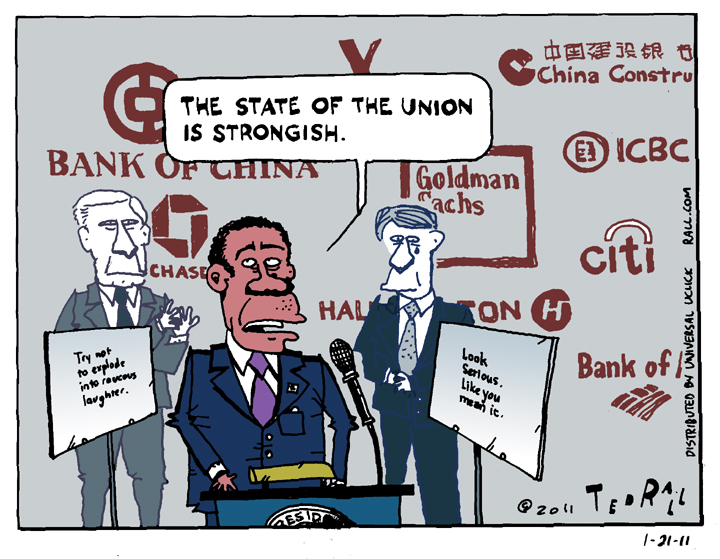Egypt’s caretaker military government is urging pro-democracy strikers to get back to work in order to save the economy. But whose economy is it?
(Mu)Barak Obama
Posted By Susan Stark
At least two dictators have been toppled from government now, and George W. Bush can’t travel to due to the threat of arrest for war crimes.
What does Obama do in response to all of this information? Propose cuts in home heating for the poor.
The lack of any sense of self-preservation in this man quite stunning and frankly very creepy.
Susan out.
SYNDICATED COLUMN: America Against the People
Why Is Obama Coddling Egyptian Dictator?
Here is Egypt, America’s neo-con dream come true. Democracy! In the Middle East! And it isn’t costing us a single soldier. You’d think American policy makers would be pleased as punch. So why are they messing it up?
At first glance the uprising in Cairo and other Egyptian cities puts the United States in an awkward spot. We’ve propped up Hosni Mubarak for three decades. If we cut him loose, our other pet dictators will stop trusting us. If we don’t, all that yapping about democracy and freedom rings hollow. Which do we choose, our purported principles or our actual allies?
Actually, it’s not that hard. We lost the trust of our puppet tyrants when Saddam dropped through the trap door. We lost the people with a zillion CIA-backed coups, not to mention the $37 billion we’ve paid to Mubarak. The dictator’s wealth is estimated at $40 billion. That’s right: no one dime of U.S. foreign aid made it to the Egyptian people.
The Obama Administration has an easy way out. They can disavow the policies of the past 30 years, policies they merely inherited. The president can make a clean break, announcing that he is cutting off U.S. funding to the Mubarak regime until things settle down. Then shut up.
Simple. Yet the president is handling this Middle Eastern crisis with all the class and diplomacy of a George W. Bush.
There’s the arrogance. On Fox News he agreed with Bill O’Reilly that he doesn’t want the Muslim Brotherhood to take over. “I want a representative government in Egypt,” Obama said. Dude, it doesn’t matter what you want or what we want. What matters is what the Egyptians want.
There’s the shortsightedness. Like previous presidents, Obama doesn’t understand that repression isn’t a synonym for stability.
There’s the failure to recognize the broader implications. Hated for Egypt’s joint blockade with Israel of the Gaza strip, Mubarak is viewed throughout the Muslim world as the embodiment of American-funded corruption. Obama’s refusal to cut him loose fuels radical Islamists’ argument that the U.S. will never allow the Palestinians to live with dignity.
Last but not least, there’s that classic Cold War-era mistake: backing the wrong side. In this case, Mubarak’s new vice president Omar Suleiman. Since 1993 Suleiman has run Egypt’s feared Mukhabarat intelligence agency. He is Egypt’s chief torturer.
As head of the General Intelligence Directorate Suleiman was the Bush Administration’s main liaison and coordinator for its “extraordinary rendition” program. Victims of extraordinary rendition are kidnapped by CIA agents and illegally transferred to other countries for the purpose of being tortured.
According to experts on the war on terror, Suleiman is a torturer’s torturer, a hard man who sets a high bar—from which he hangs his bleeding victims. Personally.
One of the CIA’s victims was Mamdouh Habib, an Egyptian-born Australian citizen. U.S. agents bought him from Pakistani intelligence and shipped him to Egypt. “In Egypt,” reports Lisa Hajjar for Al Jazeera, “he was repeatedly subjected to electric shocks, immersed in water up to his nostrils and beaten. His fingers were broken and he was hung from metal hooks. At one point, his interrogator slapped him so hard that his blindfold was dislodged, revealing the identity of his tormentor: Suleiman. Frustrated that Habib was not providing useful information or confessing to involvement in terrorism, Suleiman ordered a guard to murder a shackled prisoner in front of Habib, which he did with a vicious karate kick.”
Ibn al-Sheikh al-Libi was a former trainer in the Afghan jihadi camps who famously “confessed” a connection between Saddam and Al Qaeda while under torture in one of Suleiman’s dungeons. Colin Powell cited al-Libi’s “information” in his 2003 speech of lies to the U.N. arguing for war against Iraq.
Note the word “was.” Al-Libi died in a Libyan prison in 2009.
Evan Kohlmann, a terrorism analyst for NBC News, cites a classified source: “Al-Libi’s death coincided with the first visit by Egypt’s spymaster Omar Suleiman to Tripoli. “The Egyptians were embarrassed by this admission [that he had lied under torture…Omar Suleiman saw an opportunity to get even with al-Libi and traveled to Tripoli. By the time Omar Suleiman’s plane left Tripoli, Ibn al-Sheikh al-Libi had committed ‘suicide’.”
Suleiman’s fearsome resume may come as a surprise to you. But Egyptians know all about him. Headlines like ” Obama Backs Suleiman – Led Transition ” (from the New York Times) aren’t making us more popular.
(Ted Rall is the author of “The Anti-American Manifesto.” His website is tedrall.com.)
COPYRIGHT 2011 TED RALL
SYNDICATED COLUMN: How Obama Helps Murder Our Inner Child
Blame Politicians’ Lies, Not Apathy
I can’t stop thinking about what Obama said about Christina-Taylor Green, the nine-year-old girl shot to death in Tucson.
Christina-Taylor, said the president, saw politics “through the eyes of a child, undimmed by the cynicism or vitriol that we adults all too often take for granted.”
Those are disturbing words. But not the way Obama intended.
Obama relies on a deeply flawed assumption: that becoming cynical is an inherent part of growing up.
That’s a lie. As American citizens travel the long road from childhood to adulthood to valued members of the AARP, their political system repeatedly lets them down. Cynicism is taught. Optimism is ruthlessly crushed.
People vote for politicians who break their promises. Disappointed by the limited choices offered by the two major parties, they pick one only to see it repeatedly sell out its purported principles. As year after year slips by they watch the problems they worry about go completely unaddressed, much less solved, by their so-called representatives.
On those rare occasions that “their” government impacts their lives, it does so negatively, with taxes, fines, paperwork, parking tickets. Meanwhile the pols fatten themselves and their cronies at the public trough (before moving on to the even richer private one).
Say you have an absentee parent who drinks up the grocery money and beats you up. To protect yourself you develop a bit of a shell. Who can blame you? When you finally stop talking to the deadbeat SOB, is it fair to call you cynical?
Hardly. You’re merely acknowledging reality. You’d be a fool not to.
In researching this column I found countless articles and studies that try to explain why the United States has one of the lowest voter turnout rates on earth. Almost all suggested ways to get more Americans to the polls. None focused on the supply side of the equation: improving politicians and politics so they become more appealing to the electorate.
Ask not, Mr. President, what Americans can do to become less cynical, but rather ask what you and your pals in D.C. can do to deserve our trust.
It’s interesting to ask why many Americans are registered to vote but rarely cast a ballot. (Usually whether or not a person is registered is the best predictor as to whether or not they actually vote.) A 2006 Pew Research survey found that 42 percent of these individuals were “bored by what goes on in Washington,” 14 percent were “angry at the government,” 32 percent said “issues in D.C. don’t affect me,” and 30 percent said “voting doesn’t change things.”
These people aren’t stupid or lazy. They’re cynical, and rightly so. They think the government is evil, irrelevant, or both. Lords knows politicians give them lots of reasons to hold those beliefs.
Start, for example, with President Obama himself.
In a September 2010 interview with Rolling Stone Obama claimed to have “accomplished 70 percent of the things that we said we were going to do—and by the way, I’ve got two years left to finish the rest of the list, at minimum.”
These politicians! Even in a line about keeping promises, the dude fudges facts. “Minimum”? You can’t assume a second term when you’re president. Moreover, no one who voted for Obama in 2008 wants to wait until 2016 to see the fulfillment of a 2008 promise.
Anyway, Obama has kept a mere 24 percent of his 2008 promises. That’s according to Politifact—and their assessment is generous.
Totally broken promises—promises Obama didn’t even pretend to try to keep—include the following:
He said he would close Guantánamo concentration camp.
He said he would pull U.S. troops out of Iraq.
He said he would create a $10 billion foreclosure prevention fund.
He said he would let the Bush tax cuts expire.
He said he would eliminate warrantless wiretaps.
He said he would eliminate extraordinary renditions.
He said he would eliminate torture.
He said he would create a transparent online database related to government ethics and lobbying activities.
He said he would close the revolving door between government and private sector lobbying.
He said he would create a national publicly funded healthcare system.
So many broken promises. No wonder so many optimistic kids turn into hardboiled adults.
Politicians lie and lie and lie. Then, when we notice, they accuse us of being faithless. Us! What about them?
“I want our democracy to be as good as Christina imagined it,” Obama said. “All of us—we should do everything we can to make sure this country lives up to our children’s expectations.”
No, Mr. Obama. “All of us” don’t have to do jack. It’s not our job to take an interest in politicians. It’s the politicians’ job to take an interest in us.
(Ted Rall is the author of “The Anti-American Manifesto.” His website is tedrall.com.)
COPYRIGHT 2011 TED RALL
SYNDICATED COLUMN: It’s Mourning in America: Tacky and Weird
Somber is Out. Kitsch Reigns.
Americans don’t mourn right.
We are tacky.
We are gauche.
We turn tragedy into kitsch.
Last week’s news was dominated by the aftermath of the Tucson massacre: the memorial service, the funerals, even the reopening of the Safeway supermarket.
A memorial service at a sports arena. What is wrong with us?
I say “us” because this is not a Tucson thing or an Arizona thing. It’s all too American.
Thousands of cheering fans—er, mourners—donned “Together We Thrive: Tucson & America” T-shirts, handed out by the University of Arizona. They greeted the arrival of President Bar-Rock Star Obama with applause and wolf whistles. They interrupted with raucous hoots every couple of minutes—and he did nothing to tamp down the unruly crowd. Emergency responders got a standing ovation. Attendees clapped at the mention of the nine-year-old girl who was shot to death. Arizona governor Jan Brewer was booed.
Some called it unsettling, others unseemly. I thought it was weird and tacky. A memorial service should not feel like a WWE event.
On the lawn in front of the hospital where Congresswoman Gabrielle Giffords was being treated, USA Today reported, people placed “hundreds upon hundreds of hand-scrawled notes, stuffed animals and signs condemning the violence.”
Outside the Catholic church where the funeral for Christina Green, age 9, was being held, firefighters hung a patchwork quilt “National 9/11 Flag,” oddly blending politics, religion, and George W. Bush.
Creeeep-y.
Each mass tragedy amps up the volume and surreal inappropriateness of Americans’ public expressions of grief. After 9/11 New Yorkers posted “missing” posters for people they knew were dead. Stuffed animals and grammatically challenged notes, soggy and runny, hung from the fence at St. Paul’s Chapel near Ground Zero while vendors hawked cheap framed photos of the Twin Towers a few feet away.
Obama politicized Tucson. John McCain did the same at the televised memorial service for Pat Tillman. A group of pro-Bush 9/11 widows preened for the GOP at the 2004 Republican National Convention.
From memorial pages on Facebook to memorial decals on SUVs, Americans think anything goes when you’re mourning the death of a loved one—or someone whose death made national news, which somehow makes you want to feel involved even though, of course, you are not.
Everyone has to deal with death. No one can or should tell you how to feel. Yet you do have an obligation to comport yourself with dignity, to “stay calm and carry on,” as the British poster from World War II urged. Death is inevitable, horrible, often tragic and, as Sartre said, absurd. But please don’t drag the rest of the world into your psychological abyss. Spare society the tawdry and ostentatious displays of over-the-top yowling.
Just be sad. It’s OK.
My best friend died when I was 16. I never got over it. His death still makes me sad. I’m OK with that.
I wore a suit to his funeral. There wasn’t any cheering. I don’t think an appearance by the president or the attorney general would have reduced anyone’s grief. It was a sad thing, so sad that no one could make it better, and nobody tried.
As the cultural critic Marita Sturken wrote in her 2007 book “Tourists of History: Memory, Kitsch, and Consumerism from Oklahoma City to Ground Zero,” all this tacky phony sentimentality serves a sinister purpose. Mainstream American culture is being manipulated by government and big business to separate us from what is real—death and horror—and to obscure who is behind it—our government and big business.
“This comfort culture,” says Sturken,” can be found in everything from the small souvenirs that promise reassurance at sites like Ground Zero and the Oklahoma City memorial…Much of the culture of comfort functions as a form of depoliticization and as a means to confront loss, grief, and fear through processes that disavow politics…an American public can acquiesce to its government’s aggressive political and military policies, such as the war in Iraq, when that public is constantly reassured by the comfort offered by the consumption of patriotic objects, comfort commodities, and security consumerism.”
As the economy and political system continue to collapse, we will likely see more mass shootings and terrorist attacks. Thus we should be prepared. And we should give ourselves permission to get real about mourning.
So, as a public service to the grievers of the future, I hereby offer my
Basic Etiquette Following a Massacre:
(1) When interviewed on television never say that your “heart goes out to the victims and their families.” We have heard that hoary chestnut a million too many times. Keep your heart where it belongs, inside your ribcage.
(2) If you are a public official holding a press conference about a school shooting/workplace shooting/terrorist attack, refrain from thanking a long list of local and state officials for their help. This isn’t the Oscars. You haven’t won anything. You are not going to meet Joan Rivers.
(3) Whether attending a memorial service or actual funeral, leave your hoodies, baggy pants and tanktops at home. No baseball caps. No T-shirts. Don’t wear anything with a team logo. Appropriate clothing is formal, black or very dark blue. Men wear suits with ties. Women wear long dresses. Don’t got ’em? Stay home. You don’t get to be on CNN.
(4) If you know one or more of the victims, ask their surviving relatives whether they would prefer flowers or a donation to a preferred charity. Otherwise simply choose an appropriate charity and make a donation in their name. Do not waste money on flowers and stupid stuffed animals.
(5) Unless the victims include at least one politician, no politician should speak at the service. If there is at least one dead or wounded politician, politicians who do speak should refrain from political rhetoric.
(6) No. Applause. Ever.
NEXT WEEK: Toilet etiquette. How to wipe. How to flush.
(Ted Rall is the author of “The Anti-American Manifesto.” His website is tedrall.com.)
COPYRIGHT 2011 TED RALL






